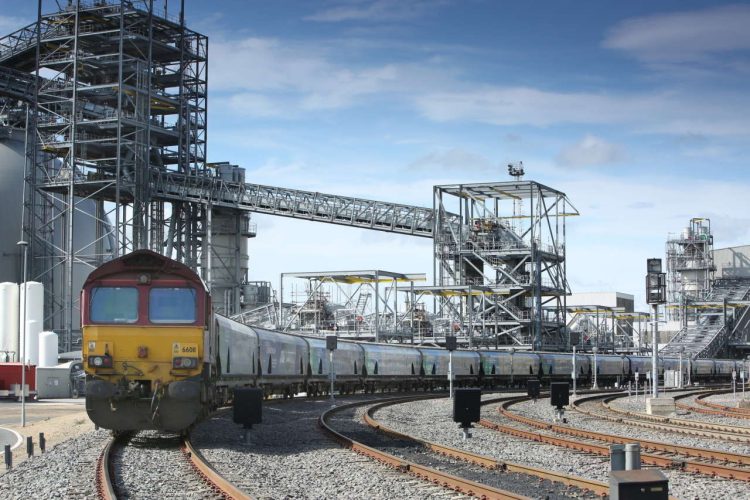All trains operated by DB Cargo UK to transport fuel for Drax Group to its renewable energy plant near Selby will now be powered by environmentally friendly Hydro-treated Vegetable Oil (HVO).
The renewable energy plant near Selby is the UK’s largest, and Drax Group, which is the UK’s leading producer of renewable energy, has switched to the 100% renewable fuel as part of its ongoing programme to reduce its carbon footprint.

DB Cargo UK operates around 60 trains a week, or approximately 3,000 trains a year, to transport around 4.5 million tonnes of biomass pellets annually to Drax.
The decision by Drax to adopt the use of HVO in its trains was a win-win for both companies.
Roger Neary, DB Cargo UK‘s Chief Sales Officer
Drax produces around 8% of the UK’s renewable power, and rail freight is critical to the power station’s supply chain.
That is enough energy to power almost 2.3m homes, equivalent to all households in Yorkshire and the Humber.

Switching from traditional red diesel to HVO is estimated to achieve a reduction of 90% in rail freight carbon emissions, and DB Cargo trains powered by HVO will provide around 57% of Drax’s total biomass.
This saves over 12,000 tonnes of carbon each year equivalent to 30 million miles worth of car journeys based on figures from the Greenhouse Gas Equivalencies Calculator.
Hydro-treated Vegetable Oil is marketed as ‘one of the world’s purest and greenest fuels,’ and is derived from 100% waste products with no virgin products used in its manufacture.
It is produced synthetically through a hydro-treatment process from vegetable oils or animal fats, and significantly reduces harmful carbon dioxide (CO2) and nitrogen oxide (NOx) emissions when used in diesel vehicles and machinery.

Rail freight was already a more sustainable method of transporting the pellets than road, taking some 192,000 HGVs off the UK’s network each year.
Bruce Heppenstall, Plant Director at Drax Power Station
Until a firm commitment is made to electrification of the UK network, HVO is the only credible solution to rail freight decarbonisation. More services could be operated with HVO if the right policies and incentives were in place to enable more customers to make the switch.
Roger Neary, DB Cargo UK’s Chief Sales Officer





Responses
Yep most probably right might as well open some coal mines again saves chopping trees down and burning thousands or tons of ships diesel to get it to Liverpool,
What a load of tosh. I’ve just sat at a level crossing waiting for the drax train, and nearly choked on the diesel fumes pouring out of it.😡
Have to eat a lot of chips to get the used veg oil
Well said Chris. Unfortunately this is a lot of greenwash. Drax is not green. When we talk renewables we think of solar or hydro, not the decimation of forests thousands of miles away
Thus it saves 1.01% of the 12.13 million tonnes of CO2 coming from the plant.
And believe it or not, is about the same amount of CO2 as coal.
That’s most commendable. But it’s a shame that the trains are hauling wood pellets to be burned at Drax and which are made from chopped down North American forests. These are hauled to the coast and then transported by ship to the UK with all of this using normal fossil fuels, so the final haul from port to Drax is only a relatively small part of the journey. The idea that all this is somehow “green” is unfortunately a fantasy, but one which makes the owners of Drax a lot of money.